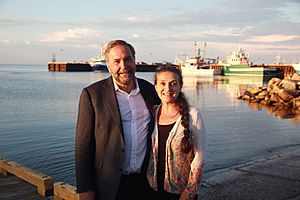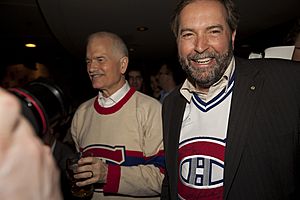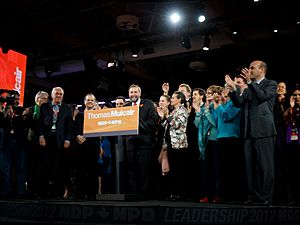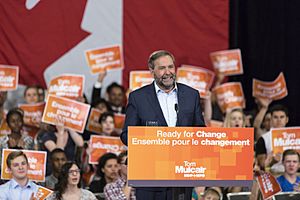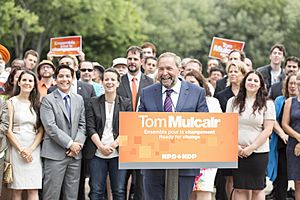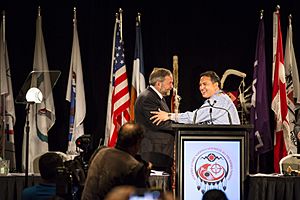Tom Mulcair facts for kids
Quick facts for kids
Tom Mulcair
|
|
|---|---|
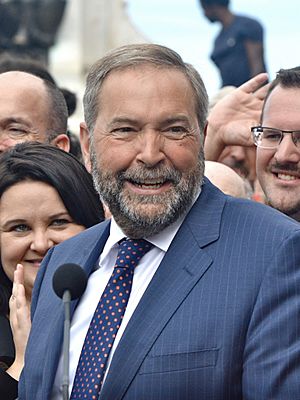
Mulcair in 2015
|
|
| Leader of the Opposition | |
| In office March 24, 2012 – November 4, 2015 |
|
| Monarch | Elizabeth II |
| Prime Minister | Stephen Harper |
| Preceded by | Nycole Turmel |
| Succeeded by | Rona Ambrose |
| Leader of the New Democratic Party | |
| In office March 24, 2012 – October 1, 2017 |
|
| Preceded by | Nycole Turmel (interim) |
| Succeeded by | Jagmeet Singh |
| Opposition House Leader | |
| In office May 26, 2011 – October 12, 2011 |
|
| Leader | Nycole Turmel (acting) |
| Preceded by | David McGuinty |
| Succeeded by | Joe Comartin |
| Member of Parliament for Outremont |
|
| In office September 17, 2007 – August 3, 2018 |
|
| Preceded by | Jean Lapierre |
| Succeeded by | Rachel Bendayan (2019) |
| Quebec Minister of the Environment | |
| In office April 29, 2003 – February 27, 2006 |
|
| Premier | Jean Charest |
| Preceded by | André Boisclair |
| Succeeded by | Claude Béchard |
| Member of the National Assembly of Quebec for Chomedey | |
| In office September 12, 1994 – March 26, 2007 |
|
| Preceded by | Lise Bacon |
| Succeeded by | Guy Ouellette |
| Personal details | |
| Born |
Thomas Joseph Mulcair
October 24, 1954 Ottawa, Ontario, Canada |
| Citizenship | |
| Political party | New Democratic (1974–present) |
| Other political affiliations |
Quebec Liberal (provincial; 1994–2007) |
| Spouse |
Catherine Pinhas
(m. 1976) |
| Children | 2 |
| Residences | Beaconsfield, Quebec |
| Alma mater | McGill University |
Thomas Joseph Mulcair (born October 24, 1954) is a Canadian lawyer and former politician. He was the leader of the New Democratic Party (NDP) from 2012 to 2017. He also served as the Leader of the Official Opposition in Canada from 2012 to 2015.
Mulcair was a Member of Parliament (MP) for Outremont from 2007 to 2018. Before that, he was a provincial politician in Quebec. He worked as a senior civil servant (a government employee) and taught law at a university.
Contents
Early Life and Education
Thomas Joseph Mulcair was born on October 24, 1954, in Ottawa, Ontario. His parents lived in Hull (now Gatineau) at the time. His father, Harry Donnelly Mulcair, worked in insurance. His mother, Jeanne Hurtubise, was a school teacher.
The Mulcair family moved to Chomedey in Laval, a suburb of Montreal. Thomas grew up there as the second oldest of ten children. He went to Laval Catholic High School. He became interested in politics and activism after organizing a successful protest at his school.
After high school, Mulcair studied social sciences at Vanier College. He then started law school at McGill University when he was 18. He worked during summers to pay for his studies. He joined the NDP when he was 19. He earned his law degrees in 1976 and 1977 and became a lawyer in 1979.
In 1976, Mulcair married Catherine Pinhas, a psychologist. They have two sons. Their oldest son, Matt, is a police sergeant and has two children, Juliette and Raphaël. Their second son, Greg, is an aerospace engineer and has one son, Leonard.
Mulcair holds citizenship in both Canada and France. He speaks both English and French fluently. He is known as "Tom" in English and "Thomas" in French.
Starting His Career
Mulcair began his career working for the Quebec government in Quebec City from 1978 to 1982. He also taught law at Saint Lawrence College.
In 1983, he moved to Montreal and became the director of legal affairs for Alliance Quebec. This group worked for the English-speaking community in Quebec. He helped change the Charter of the French Language. In 1985, he started his own law practice. He also taught law at Concordia University and other colleges.
Mulcair was named a commissioner for the Appeals Committee on the Language of Instruction from 1986 to 1987. This committee dealt with schools that were not following Quebec's language laws. He considered former Quebec Liberal Party leader Claude Ryan his political mentor during this time.
Provincial Politics in Quebec
Mulcair first became a member of the National Assembly in 1994. He won the riding of Chomedey as a member of the Quebec Liberal Party. He said he joined the Liberals because it was the main party that supported Canada staying united. He was re-elected in 1998 and again in 2003.
After the 1995 referendum, Mulcair asked for an investigation into why many ballots for the "No" side were rejected.
In 2003, Premier Jean Charest named Mulcair the Minister of Sustainable Development, Environment and Parks. During his time as minister, he supported the Kyoto Protocol. He also helped create a law that added the right to live in a healthy environment to the Quebec Charter of Human Rights and Freedoms. This law passed in 2006.
Environmental Efforts
On November 25, 2004, Mulcair introduced Quebec's Sustainable Development Plan. This plan aimed to protect the environment and use resources wisely. It included a proposed change to the Quebec Charter of Human Rights and Freedoms. This change would create a new right: the right to live in a healthy environment that respects biodiversity (the variety of life on Earth).
Mulcair's plan was based on a successful model from Europe. It was seen as very modern for North America. He traveled to 21 cities to get public feedback on the plan. The bill was approved by everyone in the National Assembly of Quebec in April 2006.
Leaving the Cabinet
In 2006, Mulcair disagreed with a plan to build condominiums in Mont Orford National Park. On February 27, 2006, Premier Charest moved Mulcair to a different, less important role in the government. Mulcair chose to resign from the government instead of accepting this change.
On February 20, 2007, he announced that he would not run again for the Liberal Party in the next provincial election.
Federal Politics
After leaving provincial politics, Mulcair thought about joining federal politics. He talked with the federal Liberal Party, the New Democratic Party, and the Conservative Party. He decided against joining the Conservatives because they disagreed on the Kyoto Protocol.
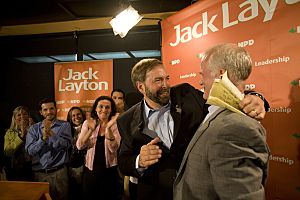
NDP leader Jack Layton convinced Mulcair to run for the NDP in Quebec. At that time, the NDP had no seats in Quebec. On April 20, 2007, Mulcair announced he would run for the NDP.
Winning a By-election
Mulcair became Layton's main representative in Quebec. On June 21, 2007, he became the NDP candidate for the Outremont riding. He won the by-election on September 17, beating the Liberal candidate. This was a big win because Outremont had been a Liberal stronghold (a riding that usually votes for one party) since 1935.
Mulcair was only the second NDP MP ever elected from Quebec. He was sworn in on October 12, 2007. He was also named co-deputy leader of the NDP.
On October 14, 2008, Mulcair was re-elected as the MP for Outremont. This made him the first New Democrat to win a riding in Quebec during a federal general election.
In the 2011 federal election, Mulcair was re-elected again. The NDP became the Official Opposition for the first time ever. This happened because the party won many seats in Quebec, a political event called the "orange wave."
Becoming NDP Leader
Federal NDP leader Jack Layton passed away on August 22, 2011. Mulcair decided to run for the federal NDP leadership. On October 13, 2011, he announced his candidacy. He gained support from many other NDP MPs.
Mulcair wanted to change the party to make it stronger in Quebec and attract voters across the country. At the leadership convention on March 24, 2012, Mulcair was elected NDP leader. He won on the fourth ballot with 57.2 percent of the vote.
Leader of the Opposition
Since the NDP had the second-largest number of seats in the House of Commons, Mulcair became the Leader of the Official Opposition. This is an important role in Canadian politics.
Mulcair supported trade deals that included rules for labour rights (workers' rights) and environmental protection. He also strongly opposed plans for the Keystone XL and Northern Gateway pipelines. He wanted a pipeline to carry western Canadian oil to be refined on Canada's east coast instead.
During the Canadian Senate expenses scandal, the NDP repeated its long-held view that the Senate should be removed. Mulcair promised to work towards this goal.
By May 2015, the NDP was doing well in public opinion polls. They were in a close race with the Liberals and Conservatives. The party also had success getting two of its bills passed in the House of Commons. One bill removed the tax on feminine hygiene products, and another aimed to stop banks from charging "pay-to-pay" fees.
2015 Election and Aftermath
In the 2015 Canadian federal election, despite early polls showing the NDP in the lead, the party lost many seats. They ended up in third place in Parliament. Mulcair's stance on certain issues during the campaign affected the party's support in Quebec.
At the NDP's party convention in April 2016, delegates voted to hold a new leadership election. This meant Mulcair would be replaced as leader. He remained leader until Jagmeet Singh was elected as his successor on October 1, 2017.
Mulcair announced he would not run for Parliament in the next federal election. He resigned his seat as MP for Outremont on August 3, 2018.
Political Ideas
Economic Policy
Mulcair supported lowering the tax rate for small businesses. He believed they create many new jobs. He also wanted to create a tax credit to encourage manufacturers to invest in new equipment for research and development.
He proposed changing some corporate tax cuts made by the previous government. He promised not to raise personal income taxes. Mulcair planned to use extra tax money to pay for things like infrastructure, public transit, and a new child care program. He also aimed for a balanced budget (where the government spends no more than it collects in taxes).
Energy Policy
Mulcair promised to end government payments that support fossil fuels. He also wanted to introduce a cap-and-trade system for carbon emissions. This system sets a limit on pollution and allows companies to trade pollution permits. He also wanted to bring back strict environmental reviews for projects.
Indigenous Relations
Mulcair said the NDP would make sure decisions respect court rulings and international duties to Indigenous peoples in Canada. He also promised to start a national public inquiry into missing and murdered Indigenous women within 100 days of taking office if his party won.
He called for a "nation-to-nation" relationship with Indigenous peoples. He said his top priority would be to improve education for First Nations.
Public Safety
Mulcair criticized the previous government's public safety policies. He said cuts to food inspection and airline safety put Canadians at risk. He also wanted the government to play a more active role in overseeing rail safety.
Women's Issues
Mulcair was critical of changes to "pay equity" laws. He said these changes would take away women's right to go to court to demand equal pay for equal work.
In 2014, Mulcair announced that an NDP government would start a national public inquiry into missing and murdered Indigenous women. He believed a full inquiry was needed to understand why violence against Indigenous women happens.
Foreign Policy
Mulcair believed Canada could be a "positive force for peace, justice and respect for human rights around the world." He said the NDP would increase funding for development aid and focus on helping reduce poverty globally.
He opposed Canada's involvement in the combat mission in Iraq against ISIS. Mulcair supported a balanced approach to the conflict in the Middle East. He stated he was a strong supporter of Israel and also supported the creation of a Palestinian state.
After Politics
On December 18, 2017, Mulcair announced he would resign from the House of Commons in June 2018. He planned to accept a position at a university. On January 11, 2018, Mulcair became the volunteer chair of Jour de la terre Québec, a group focused on environmental issues. He joined the political science department at Universite de Montreal as a visiting professor in the summer of 2018.
On July 17, 2018, Mulcair also announced he would become a political analyst for Montreal radio station CJAD. He also appears on CTV News Channel and the French-language network TVA.
Electoral Record
| Quebec general election, 1994: Chomedey | ||||||||
|---|---|---|---|---|---|---|---|---|
| Party | Candidate | Votes | % | ±% | ||||
| Liberal | Thomas Mulcair | 25,885 | 67.70 | +14.31 | ||||
| Parti Québécois | Lidi Costache | 9,239 | 24.16 | −0.44 | ||||
| Action démocratique | Gaétane Piché | 1,997 | 5.22 | – | ||||
| Equality | Gary Brown | 353 | 0.92 | −17.69 | ||||
| Economic | Richard Gagné | 243 | 0.64 | – | ||||
| CANADA! | Benjamin Simhon | 212 | 0.55 | – | ||||
| Commonwealth of Canada | John Ajemian | 154 | 0.40 | – | ||||
| Natural Law | John Wolter | 150 | 0.39 | – | ||||
| Quebec general election, 1998: Chomedey | ||||||||
|---|---|---|---|---|---|---|---|---|
| Party | Candidate | Votes | % | ±% | ||||
| Liberal | Thomas Mulcair | 28,293 | 69.87 | +2.17 | ||||
| Parti Québécois | Monia Prévost | 8,869 | 21.90 | −2.26 | ||||
| Action démocratique | Vicken Darakdjian | 2,768 | 6.84 | +1.62 | ||||
| Equality | Pierre Fortier | 368 | 0.91 | −0.01 | ||||
| Socialist Democracy | Jean-Pierre Roy | 195 | 0.48 | – | ||||
| Quebec general election, 2003: Chomedey | ||||||||
|---|---|---|---|---|---|---|---|---|
| Party | Candidate | Votes | % | ±% | ||||
| Liberal | Thomas Mulcair | 25,363 | 71.10 | +1.23 | ||||
| Parti Québécois | Coline Chhay | 6,568 | 18.41 | −3.49 | ||||
| Action démocratique | Vicken Darakdjian | 3,384 | 9.49 | +2.65 | ||||
| Marxist–Leninist | Polyvios Tsakanikas | 210 | 0.59 | – | ||||
| Equality | Robert Tamilia | 148 | 0.41 | −0.50 | ||||
| Canadian federal by-election, September 17, 2007: Outremont Resignation of Jean Lapierre |
||||||||
|---|---|---|---|---|---|---|---|---|
| Party | Candidate | Votes | % | ±% | Expenditures | |||
| New Democratic | Thomas Mulcair | 11,374 | 47.50 | +30.03 | $76,194 | |||
| Liberal | Jocelyn Coulon | 6,933 | 28.96 | −6.22 | $72,539 | |||
| Bloc Québécois | Jean-Paul Gilson | 2,618 | 10.93 | −18.08 | $57,717 | |||
| Conservative | Gilles Duguay | 2,052 | 8.57 | −4.16 | $66,401 | |||
| Green | François Pilon | 529 | 2.21 | −2.61 | $169 | |||
| neorhino.ca | François Yo Gourd | 145 | 0.61 | – | $1,774 | |||
| Independent | Mahmood Raza Baig | 78 | 0.33 | – | $45 | |||
| Independent | Jocelyne Leduc | 61 | 0.25 | – | $6 | |||
| Independent | Romain Angeles | 46 | 0.19 | – | $157 | |||
| Canadian Action | Alexandre Amirizian | 45 | 0.19 | – | $0 | |||
| Independent | Régent Millette | 32 | 0.13 | +0.08 | none listed | |||
| Independent | John Turmel | 30 | 0.13 | – | none listed | |||
| Total valid votes | 23,943 | 100.00 | ||||||
| Total rejected ballots | 175 | 0.73 | +0.03 | |||||
| Turnout | 24,118 | 37.43 | −23.35 | |||||
| Electors on the lists | 64,438 | |||||||
| New Democratic gain from Liberal | Swing | −18.3
|
||||||
| Canadian federal election, 2008: Outremont | ||||||||
|---|---|---|---|---|---|---|---|---|
| Party | Candidate | Votes | % | ±% | Expenditures | |||
| New Democratic | Tom Mulcair | 14,348 | 39.53 | −7.97 | $69,072 | |||
| Liberal | Sébastien Dhavernas | 12,005 | 33.08 | +4.12 | $45,118 | |||
| Bloc Québécois | Marcela Valdivia | 4,554 | 12.55 | +1.62 | $48,279 | |||
| Conservative | Lulzim Laloshi | 3,820 | 10.53 | +1.96 | $25,770 | |||
| Green | François Pilon | 1,566 | 4.31 | +2.10 | not listed | |||
| Total valid votes | 36,293 | 100.00 | ||||||
| Total rejected ballots | 253 | 0.69 | ||||||
| Turnout | 36,546 | 56.11 | +18.68 | |||||
| Electors on the lists | 64,556 | |||||||
| New Democratic hold | Swing | −6.05 | ||||||
| Source: Official Voting Results, 40th General Election 2008, Elections Canada: http://www.elections.ca/scripts/OVR2008/default.html. Percentage change totals are in relation to a 2007 by-election, not to the previous general election. |
||||||||
| Canadian federal election, 2011: Outremont | ||||||||
|---|---|---|---|---|---|---|---|---|
| Party | Candidate | Votes | % | ±% | Expenditures | |||
| New Democratic | Tom Mulcair | 21,906 | 56.37 | +16.84 | $80,457 | |||
| Liberal | Martin Cauchon | 9,204 | 23.69 | −9.39 | $51,130 | |||
| Conservative | Rodolphe Husny | 3,408 | 8.77 | −1.76 | $18,319 | |||
| Bloc Québécois | Élise Daoust | 3,199 | 8.23 | −4.32 | $10,456 | |||
| Green | François Pilon | 838 | 2.16 | −2.15 | $4,578 | |||
| Rhinoceros | Tommy Gaudet | 160 | 0.41 | – | ||||
| Communist | Johan Boyden | 143 | 0.37 | – | ||||
| Total valid votes | 38,858 | 100.00 | ||||||
| Total rejected ballots | 291 | 0.74 | +0.05 | |||||
| Turnout | 39,149 | 60.46 | +4.35 | |||||
| Electors on the lists | 65,573 | |||||||
| Source: Official Voting Results, 41st General Election 2011, Elections Canada: http://www.elections.ca/scripts/ovr2011/default.html | ||||||||
| NDP Federal Leadership Election, 2012 | ||||||||
| Candidate | First Ballot | % | Second Ballot | % | Third Ballot | % | Fourth Ballot | % |
|---|---|---|---|---|---|---|---|---|
| Thomas Mulcair | 19,728 | 30.30 | 23,902 | 38.25 | 27,488 | 43.82 | 33,881 | 57.22 |
| Brian Topp | 13,915 | 21.37 | 15,624 | 25.0 | 19,822 | 31.6 | 25,329 | 42.78 |
| Nathan Cullen | 10,671 | 16.39 | 12,449 | 19.92 | 15,426 | 24.59 | eliminated | |
| Peggy Nash | 8,353 | 12.83 | 10,519 | 16.83 | eliminated | |||
| Paul Dewar | 4,883 | 7.50 | withdrew | |||||
| Martin Singh | 3,821 | 5.87 | withdrew | |||||
| Niki Ashton | 3,737 | 5.74 | eliminated | |||||
| Romeo Saganash | withdrew | |||||||
| Total | 65,108 | 100 | 62,494 | 100 | 62,736 | 100 | 59,210 | 100 |
| Canadian federal election, 2015: Outremont | ||||||||
|---|---|---|---|---|---|---|---|---|
| Party | Candidate | Votes | % | ±% | Expenditures | |||
| New Democratic | Thomas Mulcair | 19,242 | 44.11 | -11.57 | – | |||
| Liberal | Rachel Bendayan | 14,597 | 33.46 | +11.84 | – | |||
| Conservative | Rodolphe Husny | 4,159 | 9.53 | +1.55 | – | |||
| Bloc Québécois | Roger Galland Barou | 3,668 | 8.41 | -3.20 | – | |||
| Green | Amara Diallo | 1,575 | 3.61 | +1.37 | – | |||
| Libertarian | Francis Pouliot | 216 | 0.50 | – | – | |||
| Communist | Adrien Welsh | 162 | 0.37 | – | – | |||
| Total valid votes/Expense limit | 43,619 | 100.00 | – | $204,392.06 | ||||
| Total rejected ballots | 426 | 0.97 | – | – | ||||
| Turnout | 44,045 | 62.42 | – | – | ||||
| Eligible voters | 70,559 | – | – | – | ||||
| Source: Elections Canada | ||||||||
See also
 In Spanish: Thomas Mulcair para niños
In Spanish: Thomas Mulcair para niños
 | Selma Burke |
 | Pauline Powell Burns |
 | Frederick J. Brown |
 | Robert Blackburn |


